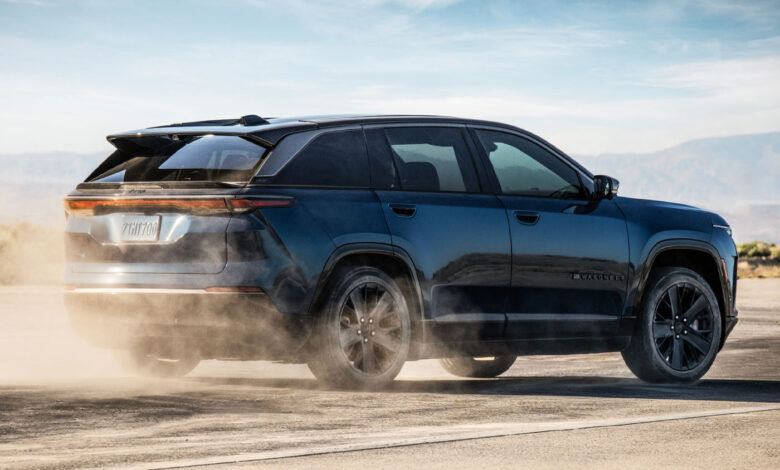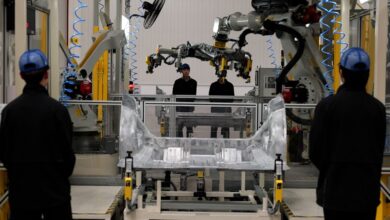Jeep officially enters the electric vehicle game with the Wagoneer S

Jeep has been slowly gearing up to enter the electric vehicle competition properly for some time and has kept all options open with its drive development. Now, the classic SUV manufacturer has made its first committed step to electrification with the Wagoneer S. The electric SUV is designed to compete with the popular Tesla Model Y, which has proven to be the most popular electric vehicle in the world. However, the Jeep Wagoneer S is about 14 centimetres longer, nearly putting the Jeep electric SUV in the next vehicle class. Interestingly, Jeep also specified that it plans to keep drive options open in future.
The Wagoneer S is a large electric SUV, based on the aptly-named STLA-Large platform, which is based on a 400-volt system in this case, capable of delivering over 800 Nm torque. Jeep proudly points out that the vehicle can accelerate from 0-60 mph in only 3.4 seconds. It can charge the 100 kWh battery from 20-80 per cent in 23 minutes, which is an odd measure since competitors generally calculate a charging time from 10-80 per cent.
The range is set at over 300 miles and the Wagoneer S will hit the market in Canada and the USA in the second half of 2024. Other global markets will follow, however, no exact timetable was presented. In terms of its international launch strategy, Jeep representatives said that the company plans to first focus its efforts in North America, launching in the US and Canada, followed by Brazil, Italy and Mexico.
Production of the Wagoneer S is apparently to start in Mexico. According to a report in Inside EVs, the electric model is to be assembled at the Toluca plant. It remains to be seen exactly how much the Wagoneer S will cost – with production in Mexico likely to be somewhat cheaper for North American customers. Considering that Jeep itself cites the Model Y as a reference, this could also apply to the price. In the USA, the Model Y built in Texas and California is available at prices between 44,990 and 51,490 dollars, depending on the version.
In terms of vehicle dimensions, the Wagoneer S features a wheelbase of 2870 mm, a width of 1900 mm at its widest point, (2123 mm, counting the mirrors) and a height of 1646 mm. It is 4887 mm long and has a ground clearance of 162 mm. In terms of storage space, the frunk has a capacity of 58 litres, while another 484 litres of storage space can be found in the trunk.
“The launch of the all-electric Jeep Wagoneer S marks a new chapter in the storied history of the Jeep brand,” said Antonio Filosa, CEO of the Jeep brand. “Building upon nearly a century of innovation and design, this first global EV will introduce a whole new generation of owners to an experience that is distinctly
Jeep and 100% electric in every way. With new energy in the Jeep vehicle lineup, ranging from EV to V-8, customers have never had more freedom to choose their own adventure.”
In terms of other technical specifications, the upcoming Wagoneer S will feature a total of five different drive modes, ranging from a standard ‘Auto’ to ‘Sport’, ‘Eco’, ‘Snow’ and ‘Sand’. As the names imply, the drive modes are designed for different traction cases, from slippery roads covered in snow to a somewhat similar lack of traction when driving on sand. Jeep’s electric drive system combines 3 functions in one, with the electric motor, the gearbox and the power electronics combined into one compact unit.
Jeep is also very proud of the new Wagoneer S’ design, which the Stellantis subsidiary claims “was designed from the brand’s legendary heritage, innovation and sophistication.” The front grille was redesigned with lighting in place of the classic grille design, as airflow is no longer needed for the motor to cool. As Jeep wrote in its press release: “The new, striking ambient lighting is inspired by modern architecture and ensures an unmistakable appearance even from a distance.”
As electrification demands higher degrees of efficiency in terms of energy usage and how it translates to the road, Jeep’s design team paid special attention to aerodynamics. The team managed to cut down the drag coefficient to a level of 0.29, which is about 15 per cent better than the average SUV design. The roof and tailgate spoiler are also angled to optimise airflow, while the flush door handles, the rear wing and the integrated edges of the vehicle direct the airflow around the vehicle and control the separation point at the rear.
In terms of interior design, Jeep is also fully banking on a more modern approach: the cockpit has screens sufficient for a usable interface area of 45 inches, as well as “a segment-exclusive interactive passenger screen.” This is split between multiple integrated screens, however, as the vehicle is centred around a 12.3-inch display, which is then surrounded by three additional screens. As a safety precaution, the additional screens can be deactivated, however, the immense screen area may play a role in distracting drivers. Coupled with 19 integrated speakers, the Wagoneer S makes for quite an impressive entertainment system. While autonomous driving functions are not fully functional on the roads in Europe, a level 2 autonomous driving system does show that Jeep is keeping the options open for the technology.



